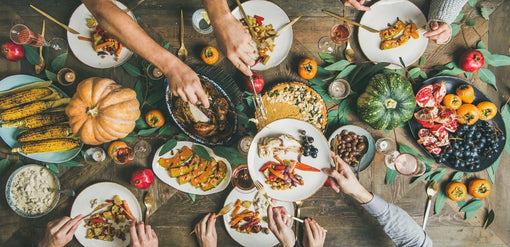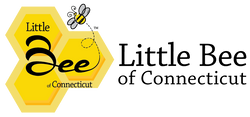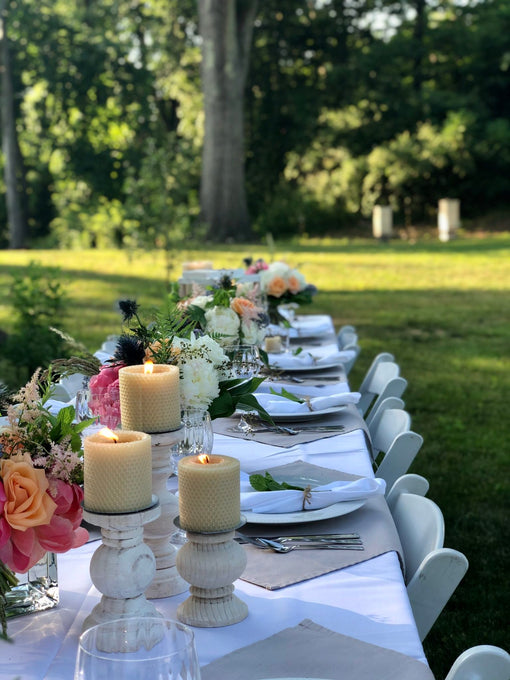
- Article published at:
- Article author: Web Dev
- Article tag: events
- Article comments count: 0
Without the honeybee, there would be no Thanksgiving Feast!
“If the bee disappeared off the surface of the globe, then man would only have four years of life left. No more bees, no more pollination, no more plants, no more animals, no more man..” —Albert Einstein
We’re very thankful that the little honey bee who has helped provide the food for our holiday feasts.
Without the honeybee, we’d be facing even more dire circumstances. Meaning…there would be NO food. Of course, honeybees don’t pollinate everything going onto our holiday tables, but they factor into the entire food chain from plant to animal to table for most foods we enjoy.
It really is quite amazing to understand the importance of their role in the world’s food sources. “…research shows that bees are responsible for pollinating approximately 16% of global flowering plants and around 400 agricultural crop plants.”1
First, a quick shout out to all the other bees including solitary bees, bumble bees and other stingless bees that play a role in pollination. You guys also ROCK when it comes to pollination! For this blog post, though, we are focusing on our favorite little bee, the honeybee, naturally. :)
We thought it would be fun to look at some of the traditional holiday foods we typically serve during the holidays and how the honeybee helps with their pollination.
Let’s start with the veggies. No Thanksgiving table is complete without squash… be it pumpkin, zucchini or decorative gourds. Do honeybees pollinate these plants?
Yes indeed, they are all pollinated by honeybees, which are considered essential to these plants’ survival. What would Thanksgiving be without pumpkin pie? We shudder to think…
What about cranberries, the staple of many Thanksgiving tables?
These delicious berries are also pollinated by the honeybee. Many growers use migratory honeybees for cranberry pollination. And the honeybee is the most effective pollinator of the cranberry flower.
How about green bean casserole, roasted Brussel sprouts or chestnuts in your stuffing? Honey bees!
Love a great Thanksgiving pie?
Honeybees are re an important contributor to the pollination plan of apples, peaches, and pears. Can you imagine NO APPLE PIE?!
Do you bake or garnish with Almonds? (Macadamias? Brazil Nuts? Cashews?)
All of these nuts would suffer without the participation and pollination from the honeybee. The data is staggering.
“The California almond industry requires approximately 1.8 million colonies of honey bees in order to adequately pollinate nearly one million acres of bearing almond orchards.” 2
So…do bees help pollinate…the turkey??
Well, not directly of course but, the honeybee is responsible for pollination of certain berries, like raspberries, that turkeys feed on in the spring. Honeybees also help pollinate clover during summer and holly in the winter, which are both eaten by wild turkeys. Farm raised turkeys are often fed a diet of corn-based grain. While corn is mostly wind-pollinated, honey bees do love to gather the pollen and while rummaging through the corn tassels clouds of pollen are released, thus aiding in corn’s naturally occurring pollination process.
And finally, a cautionary tale from the orchards in China…from the Xerces Society Guide “Attracting Native Pollinators”…
“In China’s Sichuan Province, one of the largest apple producing regions in the world, farmers perch on ladders in mountainside orchards to pollinate blossoms by hand. The farmers have adopted this practice because wild bees are now absent in their area.”
At Little Bee of CT, we give thanks to the honeybee all year long, though during the season of giving thanks, it means a lot to us to help you understand the important role the honeybee plays in the food chain, and on your Thanksgiving table.
Check out our website to browse our all-natural products created from the beeswax and honey produced by the amazing honeybee.
Don’t forget to follow @littlebeeofct on Instagram and Facebook to see what we’re getting up to each week! And look for our next free giveaway, with a golden honey theme, which will be posted soon.
Thank you for supporting Little Bee of CT and the busy beekeepers around the world!
https://www.worldatlas.com/articles/which-crops-plants-are-pollinated-by-honey-bees.html
https://www.abfnet.org/page/
Learn More


